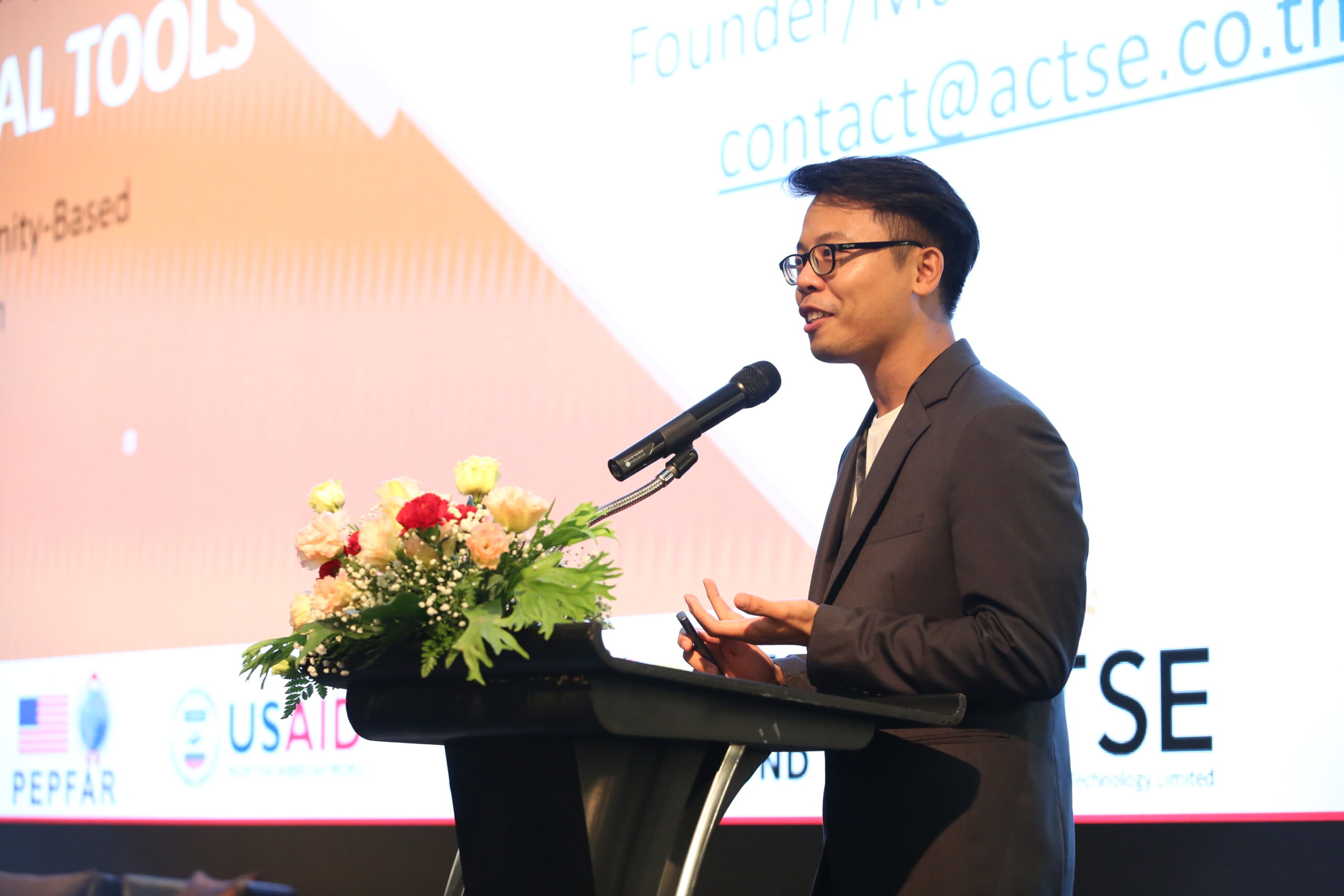Stephanie Marienau Turpin, Strategic Partnerships Advisor, FHI 360
Amita Mehrotra, Senior Technical Advisor, FHI 360
Featured image: As part of a sustainable financing strategy, ACTSE launched a social enterprise addressing a health system gap through the CAREMAT app, a real-time HIV case management tool developed by their staff to better track and manage clinical performance and retention of program clients while reducing paperwork and improving data quality. At the Sustainable Financing Forum, Managing Director Aphiwat Chawilai presented the app.
We’ve all seen it: a high-performing organization that’s effective, innovative, deeply rooted in the community it serves… and broke. Too often, organizations doing incredible work to serve HIV-affected populations find themselves unable to sustain their services or fuel their ambition for the future because of resource constraints or overreliance on a single funder.
As part of an effort to address this issue, the Meeting Targets and Maintaining Epidemic Control (EpiC) project, led by FHI 360 and funded by the United States Agency for International Development (USAID) and the U.S. President’s Emergency Plan for AIDS Relief (PEPFAR), convened a Sustainable Financing Forum in Bangkok, Thailand, on August 30-31, 2022. The forum convened leaders of key-population (KP)-led civil society organizations (CSOs) throughout South and Southeast Asia, including those with large, diversified funding models and those at the beginning of building their resource base; sustainable finance experts, including advisory groups and other social sector organizations with experience in innovative finance; government representatives; and traditional funders of HIV services like USAID and the Joint United Nations Programme on HIV/AIDS (UNAIDS) for a conversation about what sustainable finance for CSOs means, why it matters, and how KP-led organizations can move toward more resilient and sustainable funding mixes. The forum took a deeper look at two specific categories of financing: public funding for services via social contracting, and private sector models, including social enterprise development.
Funders and implementers across the Asia Pacific region offered helpful insights. Here are five key takeaways from the discussions.
1. The funding gap to meet HIV strategic targets is large and growing. According to UNAIDS financial estimates, there is a $3.5 billion gap in funding for the HIV response in low- and middle-income countries, falling 55 percent short of the projected needs for 2025. Unfortunately, the COVID-19 pandemic has only increased that gap and has underscored the importance of sustainable financing to meet health needs.
2. The road to diversification is long. KP-led organizations that have already walked the path of diversification have taken years to build their sustainable funding models. It has taken 27 years for the Humsafar Trust, a community-based organization in India, to build its budget from $1,000 to more than $4 million through innovative financing. LoveYourself, in the Philippines, estimates it will take six years to repay the private loan they needed to begin their social contracting revenue stream. In the past four years, Glink in Vietnam has been able to reduce their reliance on grants from 49 percent to 35 percent on their budget. Changing an organization’s established revenue mix is neither fast nor easy.
3. Social contracting is one option for CSO sustainability, but its application is diverse across country contexts. As an umbrella term, social contracting refers to governments funding HIV services through CSOs, but this takes different forms including health insurance reimbursements, performance-based contracts, and even government grants. Countries also pay CSOs to provide different bundles of services. The Philippines pays for antiretroviral treatment, India pays for community outreach and linkages to testing and care, and Thailand pays for outreach, HIV testing, and HIV pre-exposure prophylaxis (PrEP) services. So far, no national government in South or Southeast Asia is paying CSOs to provide the full cascade of prevention, care, and treatment services. Social contracting models can be complex and require enabling national-level regulations. For CSOs, building direct financial relationships with governments, who have the responsibility for providing health services for their residents, is an important step toward sustainability.
4. Social enterprise models can allow organizations to generate unrestricted, flexible funding. Social enterprise or earned income models can take several forms within global health, allowing organizations to generate unrestricted funding. At the forum, three models were presented:
- Health care providers who charge for their services, including those that use cross-subsidization models to maintain affordability
- Adjacent businesses unrelated to health, such as cafés, shops, salons, or food products, that generate revenue to support the provision of health services
- Innovative concepts that identify weaknesses in health systems and build new businesses to address those gaps, such as rural distribution networks for health products, home delivery of medicines, or emergency transport services
While the businesses may look quite different, the revenue they generate creates a resource flow that organizations fully control, increasing their autonomy and flexibility.
5. To build a diversified model, organizations must become more comfortable with a range of funding models and donor/client requirements. All the organizations featured at the forum who were successful in developing a sustainable financing model experimented with a range of business models, often including both social contracting and revenue-based modes. Organizations that successfully diversify their funding base design their approaches with the whole cascade of services in mind, advocate for enabling policies and regulations to facilitate their financing mix, and strengthen staff skillsets to respond to a range of funder and client requirements. As the financing ecosystem for HIV changes, sustainable organizations must increase their fluency with diverse funders and models.
Ultimately, money matters because this work matters. As the epidemic evolves, we need funding that gives organizations the strength, flexibility, and autonomy they need to evolve as well, fueling not only sustainable service delivery, but also the innovation that will achieve and sustain HIV epidemic control.

